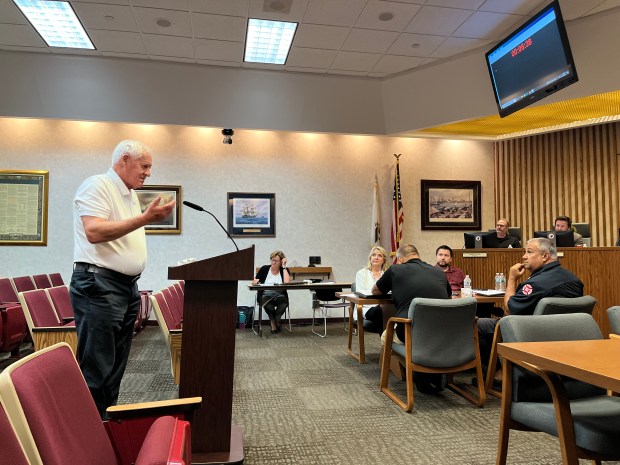Tinley Park officials raised concerns Tuesday about environmental clean-up efforts on the former mental health center property purchased by the Park District, suggesting taxpayers could bear the financial burden of funding the cleanup efforts.
The Village Board approved a $134,612 contract extension with Sewer Assessment Services for inflow and infiltration investigations, allowing for smoke testing in high-risk areas to identify defects that allows groundwater to infiltrate the village’s sanitary system.
The action came after Public Works Director John Urbanski said the Environmental Protection Agency requested permission to pump contaminated water from the former mental health site into the village’s sanitary channels.
However, Elizabeth Harvey, an environmental attorney representing the Park District, said the district does not plan to pump the stagnant water through village sewer systems. Instead, they intend to manage it on the property or in a ditch owned by the district that runs along the property.
“We are not going to pump it into the village’s sewer system. We’re not going to pump it into anything that the village owns,” Harvey said.
The village installed a valve halting outflow from the 280-acre property, which Urbanski said has seen significant flooding and was overwhelming city sanitary systems.
“There’s flooding out there, so they were looking for some sense of relief,” Urbanski said.
The property was found to contain asbestos and mold, among other hazards, which village officials fear could contaminate water systems.
“I do not want to risk our residents or our systems by allowing that type of flow into our system with those pollutants,” Urbanski said.
Harvey said the Park District tested the stagnant water on the property and did not find any contaminants.
Urbanski said he will not make a decision until he receives agreement from the Metropolitan Water Reclamation District, which treats the village’s sanitary water.
Wastewater eventually gets recycled back into the village’s water supply after undergoing extensive treatment, but Urbanski said the MWRD’s treatments are not designed to handle asbestos, PCBs or Mercury, along with the other hazardous contaminants discovered at the site.
“Their filtration may not handle it the same way, and if they don’t understand that that’s what’s coming to them, they may not be filtering that water completely,” he said.
While flooding has caused an overflow of surface water at the site, Village Clerk Nancy O’Connor, who has advocated for the site’s cleanup and redevelopment since 2017, said there are 1.6 miles of flooded tunnels and basements in the former clinic that need to be emptied.
The Park District accepted bids to remove the asbestos, among other hazardous contaminants found on the property. The cleanup, funded through a $15 million state grant awarded to the Park District in increments, would also involve demolishing the more than 45 buildings at the former clinic on 183rd and Harlem Avenue.
The village had considered commercial uses for the property, which includes the former Howe Developmental Center, but the Park District ultimately acquired the site for $1.
Larry Geraghty, a village resident and construction worker, expressed his belief that the village should take charge of the remediation project.
“They don’t have a plan for what to do with the concrete, they don’t have a plan for what to do with the water. So everything is up in the air” Geraghty said. “When the Park District drops the ball, it’s going to be the village that’s left holding it.”
Mayor Michael Glotz said he does not believe the district is equipped to handle the site’s remediation.
“There’s no oversight whatsoever,” Glotz said. “And it’s going to get dangerous quick because we have people doing this and, my opinion, that have absolutely no clue what they’re doing.”
Village attorney Michael Delgado said he does not think the water should be discharged through the village’s stormwater systems either.
If contaminated water from the mental health clinic was to enter the village’s stormwater system, it would be discharged untreated into freshwater, potentially violating EPA regulations, MWRD guidelines and public trust obligations, he said.
“There’s other ways for drainage to exit the property but it’s not through our managed systems,” Urbanski said.
smoilanen@chicagotribue.com




